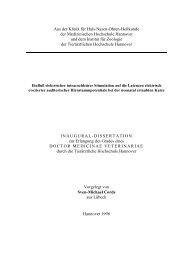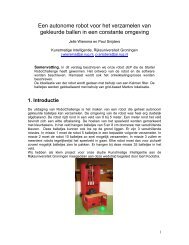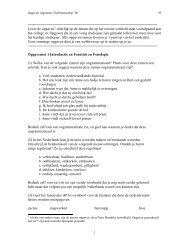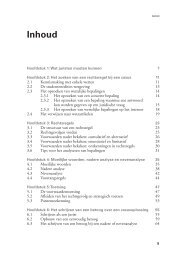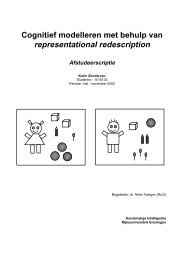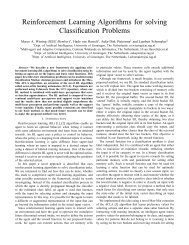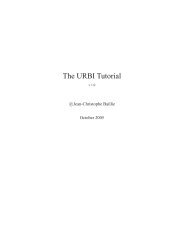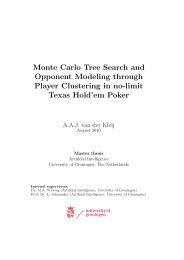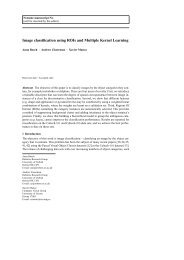Presuppositions in Spoken Discourse
Presuppositions in Spoken Discourse
Presuppositions in Spoken Discourse
You also want an ePaper? Increase the reach of your titles
YUMPU automatically turns print PDFs into web optimized ePapers that Google loves.
Chapter 3<br />
<strong>in</strong>formation. There do not seem to be any specific proposals for DRT either. This<br />
is an area that needs further study to at least give guidel<strong>in</strong>es on how the<br />
contribution of this <strong>in</strong>formation could be partially represented.<br />
The second k<strong>in</strong>d of <strong>in</strong>formation that is difficult to handle is temporal and<br />
spatial references whose exact values can only be calculated with access to the<br />
location and time of the dialogues. The <strong>in</strong>formation provided with the corpus<br />
conta<strong>in</strong>s only the year of the record<strong>in</strong>g, and no <strong>in</strong>formation about season, time of<br />
day or location. This means that these types of references, which can however<br />
often be understood by read<strong>in</strong>g the entire transcript, cannot be properly modeled<br />
or taken <strong>in</strong>to account <strong>in</strong> an explicit way <strong>in</strong> the analysis. For the most part they do<br />
not affect the analysis. Generally, what is important are the times and locations of<br />
described events <strong>in</strong> relation to each other and not the actual time of the<br />
conversation. There is some work on <strong>in</strong>tegrat<strong>in</strong>g this type of <strong>in</strong>formation <strong>in</strong>to DRT<br />
because it affects many different types of l<strong>in</strong>guistic phenomena. For example,<br />
Krause et al. (1999) <strong>in</strong> their work on the representation of localization dialogues<br />
attempt to <strong>in</strong>tegrate spatio-temporal knowledge <strong>in</strong>to the DRSs. Aga<strong>in</strong>, when it<br />
seems to affect of the analysis of the presupposition, I will po<strong>in</strong>t this out.<br />
The third type of <strong>in</strong>formation is the common ground shared by the<br />
participants. There are frequent references to <strong>in</strong>dividuals, events, places, and even<br />
procedures that are completely foreign to a transcript reader. This has a large effect<br />
on the analysis of the presupposed <strong>in</strong>formation, especially for those examples that<br />
are considered to be accommodated. I have tried to po<strong>in</strong>t out where there are<br />
problems <strong>in</strong> completely <strong>in</strong>terpret<strong>in</strong>g the work as often as it arises. Exactly how<br />
common ground or shared <strong>in</strong>formation contributes to dialogue is someth<strong>in</strong>g for<br />
which there are many proposals, and much theoretical discussion. The <strong>in</strong>terested<br />
reader can look at Zeevat (1997, ms; 1998). I will po<strong>in</strong>t out <strong>in</strong> the analysis of the<br />
examples cases where the shared <strong>in</strong>formation between the participants has made<br />
full understand<strong>in</strong>g of the presupposition difficult.<br />
F<strong>in</strong>ally, general world knowledge is cont<strong>in</strong>ually be<strong>in</strong>g used by speakers to<br />
support their communication, and while a great deal of this world knowledge is<br />
fortunately someth<strong>in</strong>g I share with the discourse participants, there is much that is<br />
unclear and sometimes difficult to <strong>in</strong>terpret without carefully read<strong>in</strong>g the entire<br />
transcript several times. Some of these difficulties have to do with the fact that<br />
most of the record<strong>in</strong>gs were made <strong>in</strong> the late 60s and early 70’s <strong>in</strong> England. They<br />
therefore conta<strong>in</strong> references to th<strong>in</strong>gs that are not part of my world knowledge, as<br />
an American of a younger generation. But for the most part I don’t believe this has<br />
affected the analysis of the presuppositions more than mak<strong>in</strong>g study<strong>in</strong>g the<br />
transcripts more of a challenge than they would perhaps be for a British researcher<br />
from the same generation as the record<strong>in</strong>gs. I have tried to obta<strong>in</strong> help from<br />
someone more familiar with this dialect and the references made by the speakers<br />
for problem examples. If I was unsure about an analysis, I will po<strong>in</strong>t this out.<br />
54



